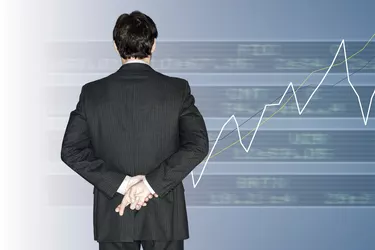
As you invest in the stock market over the years or wonder about your 401(k), pension, money market or mutual funds, you should be aware of cyclical events that affect your money. Reviewing some basic stock market characteristics will help you keep an eye on trends that might prompt a call to your money manager.
Read More: Stock Market Terms for Dummies
Video of the Day
Video of the Day
1. Episodes of Volatility
Stock markets experience wild swings due to economic factors, government elections, new legislation and other factors. For example the U.S. stock market loses 500 or 1,000 points a day when investors panic, often recovering the entire loss in a matter of days or a week. These episodes shouldn't impact long-term investors, but can hurt short-term investors who look to make daily or weekly profits and gamble shorting stocks, for example.
2. Government Regulation and Oversight
Stock markets are not private businesses with little or no policing. Governments oversee their stock markets by regulating their exchanges and setting rules regarding how stocks can be traded, how publicly traded companies report their finances, insider trading, regulations for initial public offerings and other activities.
In the U.S., the U.S. Securities and Exchange Commission sets rules and regulations, managing stock market organization and levying fines and jail sentences for companies and people who break the law when the trading of stocks, bonds, commodities, oil and other securities.
Read More: How to Follow the Stock Market
3. Risk and Rewards for Investors
A stock market provides an opportunity for investors to make a profit in exchange for providing businesses working capital to expand their operations. However, with risk comes reward, and each time a stock is traded, someone "wins" and someone "loses" because the stock either goes up or down after the trade.
In extreme cases, investors can turn a modest purchase into huge profits. In other cases, investors can lose everything when a company crashes. The riskier a stock, the more reward it often offers. This is why younger investors often include riskier stocks in their portfolios and older investors have more secure – but low-yield – instruments. If a young person loses money, she has decades to recover, whereas an older person nearing retirement can't afford to take a big hit.
4. Irrational Exuberance of Investors
With more and more amateur investors having access to the stock market through trading apps and websites, stock exchange characteristics include more and more gambling, making exchanges more like casinos. Even professional investors make riskier bets when a housing, tech or other bubble occurs.
In 1996, U.S. Federal Reserve Chairman Alan Greenspan coined the term "irrational exuberance" when describing the dot-com bubble. The crash of the housing bubble in 2008 caused a decade-long recession that seriously damaged stock markets and world economies.
Read More: How to Understand the Stock Market
5. Bull and Bear Markets
Stock markets experience long periods of down cycles and upswings, known as bull and bear markets. Professional traders play bull and bear markets using a variety of techniques, switching from stocks to bonds or vice versa, shorting stocks or pulling money out of the market for a while and sitting on cash or investing in gold or currencies, riding out a bear market, for example.
6. Subject to International Events
Stock markets are affected by government crises, such as recession in a major economic power like the U.S. or China. When the U.S. switches from a Republican to Democratic party president, markets react positively or negatively, depending on the incoming president's campaign promises regarding the economy. Wars and military interventions, or looming threats of these occurrences, also spook the stock market, often causing gold and oil prices to spike.